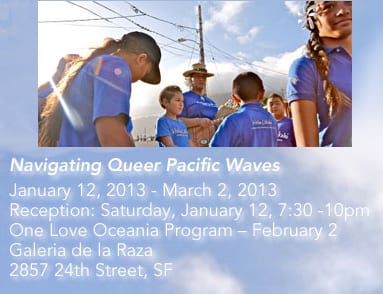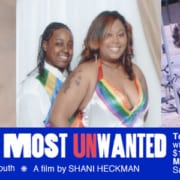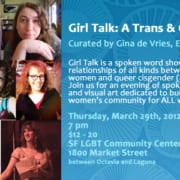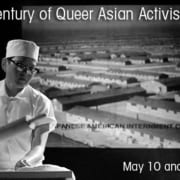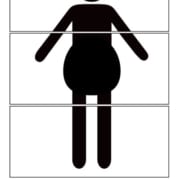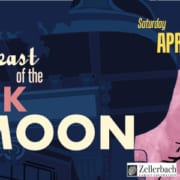Navigating Queer Pacific Waves
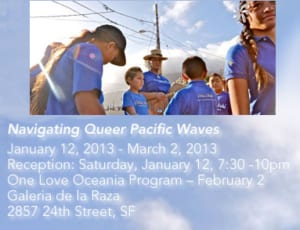 Navigating Queer Pacific Waves
Navigating Queer Pacific Waves
January 12, 2013 – Saturday, March 2, 2013
Opening reception Saturday, January 12, 7:30pm-10pm
One Love Oceania Program – February 2
Galeria de la Raza
2857 24th Street, SF
Qcc & Galería de la Raza are pleased to present Navigating Queer Pacific Waves, a group exhibition featuring new works by lead artist Jean Melesaine and Fuifuilupe Niumeitolu, Jorge Manuel Gonzales, Joy Enomoto, and additional collaborating artists. The show will feature narratives of queer Oceanic peoples, while also re-introducing the word ‘Oceania’ as returning to indigenous roots in relation to Pacific Islanders (Maori, Samoan, Fijian, Chamorro, Tongan, Refaluwash, and more) via documentary photography, painting, and mixed mediums.
Navigating Queer Pacific Waves explores constructions of queer Pacific Islander identity alongside historical narratives of Western colonial practices, the latter of which sought to silence and eradicate queer identities from these communities. By interviewing and profiling 15 different individuals from the Pacific Islands who identify as queer, the artists in the exhibition seek to re-tell and re-claim queerness as not only integral to Pacific Islander culture, but also as central to the well-being of their communities. Participating subjects, who range from a young butch 15 year-old Samoan girl living in Hunters Point to a 50-year old gay Tongan professor living in Berkeley, show the diversity within this community. Through everyone’s shared experiences, an alternate queer Pacific Island history is offered. Researching “queer Pacific Island history” yields very few, if no results; creating a history written for not only Pacific Islanders, but for queer Pacific Islanders, is the first step in Navigating Queer Pacific Waves.
Navigating Queer Pacific Waves is the recipient of Qcc’s Creating Queer Community/Healthy Communities Program & Galería’s 2011/2012 GINAA (Grantwriting for Indigenous and Native American Artists) Program. These programs are made possible with the support of the Native American Arts and Cultural Traditions Program and the Arts & Communities: Innovative Partnerships (ACIP) Program of the San Francisco Arts Commission.
_________________________________________________________________________
Lead artist statement, Jean Melesaine – As a Pacific Islander artist, watching my mother cooking “palusami,” the way she arranged the leaves on the tables, the way she stirred coconut “sua,” there was an art to how she moved. The way my father mopped the basketball courts in the Mormon church was a musical. How the light would hit my sister’s face as she worked the streets…the way my little cousin can fight to curve her mouth after being shot…as a photographer, I was born into it all. The way I grew up, I have to recognize that these moments even as a scintilla or minor second are my history, lost imagery that only gets remembered in my mind. To be able to tell the story through photos, especially for Pacific Islanders in the urban diaspora, there is a responsibility of a history at loss. In any sense of art, photography, or media, you have to honor the people you live for, who give you a sense of life.
“When you deny people’s humanity with media, you endorse violence against them.” –Lovato
_________________________________________________________________________
About the artists: Jean Melesaine is a queer Samoan artist and one of the founding members of One Love Oceania, a queer Pacific Islander womyns artist/activist collective. She studied photo consciousness with Charisse Domingo and Raj Jayadev of Silicon Valley De-Bug, a media, community organizing and entrepreneurial collective based out of San Jose, California, and is now a community organizer and associate editor for the organization. She was born and raised all around the Bay Area: from East Side San Jose to the Bayview in San Francisco, and currently resides in Oakland. She has taught workshops on using media arts and consciousness from McAllen pueblas to Brazil favelas. She is the recent 2013 Tautai Artist in Residence in Auckland, New Zealand and will be working with the Pacific Islander communities there. Her parents are from the villages of Moamoa and Falealili, Western Samoa. She is named after her grandmother Elia Melesaine.
Fuifuilupe Niumeitolu is a Tongan American scholar, poet, community organizer, and doctoral student at the University of California, Berkeley. She is co-editor of “Usos On Freeways: An Anthology of Pacific Islander Writers From/In the Continental United States,” a collection published in fall 2010. Fuifuilupe is a founding and/or board member of several advocacy organizations for Pacific Islander communities in Northern and Southern California, and currently works with community organizations and prisoners advocating for prisoners’ rights here in California.
Jorge Manuel Gonzalez is an installation artist from South Central Los Angeles, currently based in Oakland. A doctorate graduate from UC Berkeley’s Ethnic Studies program, he currently is a lecturer at his alma mater and also works at the Oakland Museum of California.
Joy Enomoto is a mixed-media artist living in Honolulu, Hawai‘i. She is of Native Hawaiian, African-American, Japanese, Caddo Indian, and Sikh Indian decent. Her work engages ancestral memory, social justice, and those issues currently affecting Pacific peoples. Her most recent work has shown at the Hawai‘i Craftsmen’s Biennial Fiber Exhibit. She was also the first recipient of the R&D Book Award for her work in photography. Enomoto has a BA from UC Berkeley in English, and is currently pursuing a BFA from UH Manoa in photography.

